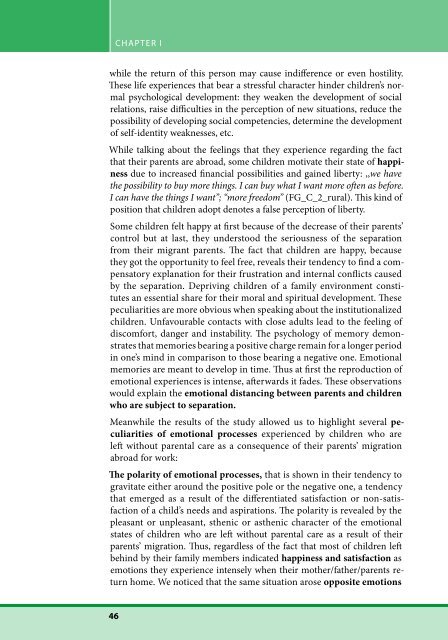specific needs of children and elderly left behind as a ... - IOM Moldova
specific needs of children and elderly left behind as a ... - IOM Moldova
specific needs of children and elderly left behind as a ... - IOM Moldova
Create successful ePaper yourself
Turn your PDF publications into a flip-book with our unique Google optimized e-Paper software.
CHAPTER I<br />
while the return <strong>of</strong> this person may cause indifference or even hostility.<br />
These life experiences that bear a stressful character hinder <strong>children</strong>’s normal<br />
psychological development: they weaken the development <strong>of</strong> social<br />
relations, raise difficulties in the perception <strong>of</strong> new situations, reduce the<br />
possibility <strong>of</strong> developing social competencies, determine the development<br />
<strong>of</strong> self-identity weaknesses, etc.<br />
While talking about the feelings that they experience regarding the fact<br />
that their parents are abroad, some <strong>children</strong> motivate their state <strong>of</strong> happiness<br />
due to incre<strong>as</strong>ed financial possibilities <strong>and</strong> gained liberty: ,,we have<br />
the possibility to buy more things. I can buy what I want more <strong>of</strong>ten <strong>as</strong> before.<br />
I can have the things I want”; “more freedom” (FG_C_2_rural). This kind <strong>of</strong><br />
position that <strong>children</strong> adopt denotes a false perception <strong>of</strong> liberty.<br />
Some <strong>children</strong> felt happy at first because <strong>of</strong> the decre<strong>as</strong>e <strong>of</strong> their parents’<br />
control but at l<strong>as</strong>t, they understood the seriousness <strong>of</strong> the separation<br />
from their migrant parents. The fact that <strong>children</strong> are happy, because<br />
they got the opportunity to feel free, reveals their tendency to find a compensatory<br />
explanation for their frustration <strong>and</strong> internal conflicts caused<br />
by the separation. Depriving <strong>children</strong> <strong>of</strong> a family environment constitutes<br />
an essential share for their moral <strong>and</strong> spiritual development. These<br />
peculiarities are more obvious when speaking about the institutionalized<br />
<strong>children</strong>. Unfavourable contacts with close adults lead to the feeling <strong>of</strong><br />
discomfort, danger <strong>and</strong> instability. The psychology <strong>of</strong> memory demonstrates<br />
that memories bearing a positive charge remain for a longer period<br />
in one’s mind in comparison to those bearing a negative one. Emotional<br />
memories are meant to develop in time. Thus at first the reproduction <strong>of</strong><br />
emotional experiences is intense, afterwards it fades. These observations<br />
would explain the emotional distancing between parents <strong>and</strong> <strong>children</strong><br />
who are subject to separation.<br />
Meanwhile the results <strong>of</strong> the study allowed us to highlight several peculiarities<br />
<strong>of</strong> emotional processes experienced by <strong>children</strong> who are<br />
<strong>left</strong> without parental care <strong>as</strong> a consequence <strong>of</strong> their parents’ migration<br />
abroad for work:<br />
The polarity <strong>of</strong> emotional processes, that is shown in their tendency to<br />
gravitate either around the positive pole or the negative one, a tendency<br />
that emerged <strong>as</strong> a result <strong>of</strong> the differentiated satisfaction or non-satisfaction<br />
<strong>of</strong> a child’s <strong>needs</strong> <strong>and</strong> <strong>as</strong>pirations. The polarity is revealed by the<br />
ple<strong>as</strong>ant or unple<strong>as</strong>ant, sthenic or <strong>as</strong>thenic character <strong>of</strong> the emotional<br />
states <strong>of</strong> <strong>children</strong> who are <strong>left</strong> without parental care <strong>as</strong> a result <strong>of</strong> their<br />
parents’ migration. Thus, regardless <strong>of</strong> the fact that most <strong>of</strong> <strong>children</strong> <strong>left</strong><br />
<strong>behind</strong> by their family members indicated happiness <strong>and</strong> satisfaction <strong>as</strong><br />
emotions they experience intensely when their mother/father/parents return<br />
home. We noticed that the same situation arose opposite emotions<br />
46

















